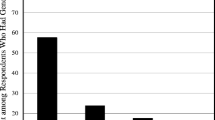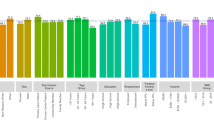Abstract
Little of the research involving individuals undergoing testing for BRCA1/2 mutations has examined the effect of genetic counseling and testing on diet, exercise, and vitamin use. This study examined diet, exercise, and vitamin use among 120 Ashkenazi Jewish individuals with a personal and/or family history of breast and/or ovarian cancer who presented for BRCA1/2 genetic counseling and testing. Health behaviors were measured at pre-counseling and 6 months post-results. T-tests or ANOVAs were used to test for association of health behaviors with potential predictors: personal cancer history, anxiety, perceived cancer risk, gene status, and perceived efficacy of health behaviors. Multivariable linear regression analysis found gender (P = .007) and perceived efficacy of a healthy diet (P = .005) to be significantly associated with healthy food consumption; gender (P = .003), education (P = .01), and personal cancer history (P = .02) were significantly associated with unhealthy food consumption; higher age (P < .001) and perceived efficacy (P < .001) were significantly associated with higher vitamin use. Paired t-tests found no significant changes in diet, vitamin use, and exercise as a result of genetic counseling and testing. We conclude that genetic counseling and testing had little impact on health behaviors. Rather, perceived efficacies of certain health behaviors to prevent or delay cancer may be more reliable predictors of those behaviors. Clinicians should assess perceived efficacies of health behaviors in their interventions to improve healthy practices in the BRCA1/2 genetic testing population.
Similar content being viewed by others
Abbreviations
- DQI-R:
-
Diet quality index-revised
- CHEI:
-
Canadian healthy eating index
- CAM:
-
Complementary and alternative medicine
References
Antoniou A, Pharoah PD, Narod S et al (2003) Average risks of breast and ovarian cancer associated with BRCA1 or BRCA2 mutations detected in case series unselected for family history: a combined analysis of 22 studies. Am J Hum Genet 72:1117–1130. doi:10.1086/375033
Easton DF, Steele L, Fields P et al (1997) Cancer risks in two large breast cancer families linked to BRCA2 on chromosome 13q12-13. Am J Hum Genet 61:120-128
d’Agincourt-Canning L (2006) A gift or a yoke? Women’s and men’s responses to genetic risk information from BRCA1 and BRCA2 testing. Clin Genet 70:462–472. doi:10.1111/j.1399-0004.2006.00720.x
Leventhal H, Diefenbach MA, Leventhal EA (1992) Illness cognition: using common sense to understand treatment adherence and affect cognition interactions. Cogn Ther Res 16:143–163. doi:10.1007/BF01173486
Chajes V, Thiebaut AC, Rotival M et al (2008) Association between serum trans-monounsaturated fatty acids and breast cancer risk in the E3N-EPIC study. Am J Epidemiol 167:1312–1320. doi:10.1093/aje/kwn069
Willett WC (1999) Dietary fat and breast cancer. Toxicol Sci 52:127–146
Howe GR (1994) Dietary fat and breast cancer risks. An epidemiologic perspective. Cancer 74:1078–1084. doi:10.1002/1097-0142(19940801)74:3<1078::AID-CNCR2820741516>3.0.CO;2-H
Willett WC, Hunter DJ, Stampfer MJ et al (1992) Dietary fat and fiber in relation to risk of breast cancer. An 8-year follow-up. JAMA 268:2037–2044. doi:10.1001/jama.268.15.2037
Philips R, Snowdon D (1983) Association of meat and coffee use with cancers of the large bowel, breast, and prostate among seventh-day adventists: preliminary results. Cancer Res 43:2403–2408
Toniolo P, Riboli E, Shore RE et al (1994) Consumption of meat, animal products, protein, and fat and risk of breast cancer: a prospective cohort study in New York. Epidemiology 5:391–397
Hirayama T (1985) A large scale cohort study on cancer risks by diet—with special reference to the risk reducing effects of green–yellow vegetable consumption. Princess Takamatsu Symp 16:41–53
Gandini S, Merzenich H, Robertson C et al (2000) Meta-analysis of studies on breast cancer risk and diet: the role of fruit and vegetable consumption and the intake of associated micronutrients. Eur J Cancer 36:636–646. doi:10.1016/S0959-8049(00)00022-8
Nkondjock A, Ghadirian P (2007) Diet quality and BRCA-associated breast cancer risk. Breast Cancer Res Treat 103:361–369. doi:10.1007/s10549-006-9371-0
McGuire V, John E, Felberg A et al (2006) No increased risk of breast cancer associated with alcohol consumption among carriers of BRCA1 and BRCA2 mutations ages <50 years. Cancer Epidemiol Biomarkers Prev 15:1565–1567. doi:10.1158/1055-9965.EPI-06-0323
Nkondjock A, Robidoux A, Paredes Y et al (2006) Diet, lifestyle and BRCA-related breast cancer risk among French–Canadians. Breast Cancer Res Treat 98:285–294. doi:10.1007/s10549-006-9161-8
Brunet JS, Ghadirian P, Rebbeck TR et al (1998) Effect of smoking on breast cancer in carriers of mutant BRCA1 or BRCA2 genes. J Natl Cancer Inst 90:761–766. doi:10.1093/jnci/90.10.761
Bowen DJ, Alfano CM, McGregor BA et al (2004) The relationship between perceived risk, affect, and health behaviors. Cancer Detect Prev 28:409–417. doi:10.1016/j.cdp.2004.08.008
Lemon SC, Zapka JG, Clemow L (2004) Health behavior change among women with recent familial diagnosis of breast cancer. Prev Med 39:253–262. doi:10.1016/j.ypmed.2004.03.039
Cho E, Spiegelman D, Hunter DJ et al (2003) Premenopausal intakes of vitamins A, C, and E, folate, and carotenoids, and risk of breast cancer. Cancer Epidemiol Biomarkers Prev 12:713–720
Zhang SM (2004) Role of vitamins in the risk, prevention, and treatment of breast cancer. Curr Opin Obstet Gynecol 16:19–25. doi:10.1097/00001703-200402000-00005
Abbas S, Linseisen J, Slanger T et al (2008) Serum 25-hydroxyvitamin D and risk of post-menopausal breast cancer—results of a large case-control study. Carcinogenesis 29:93–99. doi:10.1093/carcin/bgm240
Ishitani K, Lin J, Manson JE et al (2008) A prospective study of multivitamin supplement use and risk of breast cancer. Am J Epidemiol 167(10):1197–1206. doi:10.1093/aje/kwn027
Kotsopoulos J, Narod SA (2005) Towards a dietary prevention of hereditary breast cancer. Cancer Causes Control 16:125–138. doi:10.1007/s10552-004-2593-8
Matthews AK, Sellergren SA, Huo D et al (2007) Complementary and alternative medicine use among breast cancer survivors. J Altern Complement Med 13:555–562. doi:10.1089/acm.2007.03-9040
Helyer LK, Chin S, Chui BK et al (2006) The use of complementary and alternative medicines among patients with locally advanced breast cancer—a descriptive study. BMC Cancer 6:39. doi:10.1186/1471-2407-6-39
Rakovitch E, Pignol JP, Chartier C et al (2005) Complementary and alternative medicine use is associated with an increased perception of breast cancer risk and death. Breast Cancer Res Treat 90:139–148. doi:10.1007/s10549-004-3779-1
Alamian A, Rouleau I, Simard J et al (2006) Use of dietary supplements among women at high risk of hereditary breast and ovarian cancer (HBOC) tested for cancer susceptibility. Nutr Cancer 54:157–165. doi:10.1207/s15327914nc5402_1
King MC, Marks JH, Mandell JB (2003) Breast and ovarian cancer risks due to inherited mutations in BRCA1 and BRCA2. Science 302:643–646. doi:10.1126/science.1088759
Audrain J, Schwartz M, Herrera J et al (2001) Physical activity in first-degree relatives of breast cancer patients. J Behav Med 24:587–603. doi:10.1023/A:1012943411367
Rabin C, Pinto B (2006) Cancer-related beliefs and health behavior change among breast cancer survivors and their first-degree relatives. Psychooncology 15:701–712. doi:10.1002/pon.1000
Spector D (2007) Lifestyle behaviors in women with a BRCA1 or BRCA2 genetic mutation: an exploratory study guided by concepts derived from the health belief model. Cancer Nurs 30:1–10. doi:10.1097/00002820-200701000-00015
Digianni L, Rue M, Emmons KM et al (2006) Complementary medicine use before and 1 year following genetic testing for BRCA 1/2 mutations. Cancer Epidemiol Biomarkers Prev 15:70–75. doi:10.1158/1055-9965.EPI-05-0646
Roa BB, Boyd AA, Volcik K et al (1996) Ashkenazi Jewish population frequencies for common mutations in BRCA1 and BRCA2. Nat Genet 14:185–187. doi:10.1038/ng1096-185
Kelly K, Leventhal H, Marvin M et al (2004) Subjective and objective risk of breast cancer in Ashkenazi Jewish individuals at risk for BRCA1/2 mutations. Genet Test 8:139–147
Kelly K, Leventhal H, Andrykowski M et al (2005) Using the common sense model to understand perceived cancer risk in individuals testing for BRCA1/2 mutations. Psychooncology 14:34–48. doi:10.1002/pon.805
Trepanier A, Ahrens M, McKinnon W et al (2004) Genetic cancer risk assessment and counseling: recommendations of the national society of genetic counselors. J Genet Couns 13:83–114. doi:10.1023/B:JOGC.0000018821.48330.77
Tonin P, Weber B, Offit K et al (1996) Frequency of recurrent BRCA1 and BRCA2 mutations in Ashkenazi Jewish breast cancer families. Nat Med 2:1179–1183. doi:10.1038/nm1196-1179
Kelly K, Leventhal H, Andrykowski M et al (2004) The decision to test in women receiving genetic counseling for BRCA1 and BRCA2 mutations. J Genet Couns 13:237–257. doi:10.1023/B:JOGC.0000027959.37096.78
McNair D, Lorr M, Droppleman L (1971) Profile of mood states. Educational and Industrial Testing Service, San Diego, CA
Lerman C, Trock B, Rimer BK et al (1991) Psychological side effects of breast cancer screening. Health Psychol 10:259–267. doi:10.1037/0278-6133.10.4.259
Lerman C, Kash K, Stefanek M (1994) Younger women at increased risk for breast cancer: perceived risk, psychological well-being, and surveillance behavior. J Natl Cancer Inst Monogr 16:171–176
Benyamini Y, Idler EL, Leventhal H et al (2000) Positive affect and function as influences on self-assessments of health: expanding our view beyond illness and disability. J Gerontol 55B:107–116
Lindsey AM, Waltman N, Gross G et al (2004) Cancer risk-reduction behaviors of breast cancer survivors. West J Nurs Res 26:872–890. doi:10.1177/0193945903261274
McBride CM, Clipp E, Peterson BL et al (2000) Psychological impact of diagnosis and risk reduction among cancer survivors. Psychooncology 9:418–427. doi:10.1002/1099-1611(200009/10)9:55<418::AID-PON474>3.0.CO;2-E
Acknowledgments
Funding was provided by the Mid-Atlantic Regional Human Genetics Network (MARHGN), New Jersey Commission on Cancer Research (NJCCR), the National Cancer Institute (R03 CA128459-01) and the Roessler Research Scholarship Fund.
Author information
Authors and Affiliations
Corresponding author
Rights and permissions
About this article
Cite this article
Quach, J., Porter, K., Leventhal, H. et al. Health behaviors among Ashkenazi Jewish individuals receiving counseling for BRCA1 and BRCA2 mutations. Familial Cancer 8, 241–250 (2009). https://doi.org/10.1007/s10689-009-9235-y
Received:
Accepted:
Published:
Issue Date:
DOI: https://doi.org/10.1007/s10689-009-9235-y




